-
 Bitcoin
Bitcoin $82,770.9885
-0.53% -
 Ethereum
Ethereum $1,811.0838
-0.62% -
 Tether USDt
Tether USDt $0.9996
-0.01% -
 XRP
XRP $2.0610
1.56% -
 BNB
BNB $591.5998
-0.12% -
 USDC
USDC $0.9999
0.00% -
 Solana
Solana $116.7637
-3.59% -
 Dogecoin
Dogecoin $0.1606
-2.58% -
 Cardano
Cardano $0.6491
0.00% -
 TRON
TRON $0.2375
1.32% -
 Toncoin
Toncoin $3.6204
-7.56% -
 UNUS SED LEO
UNUS SED LEO $9.4063
0.23% -
 Chainlink
Chainlink $12.8000
-2.19% -
 Stellar
Stellar $0.2605
1.01% -
 Avalanche
Avalanche $18.1124
-1.26% -
 Sui
Sui $2.2384
-2.51% -
 Shiba Inu
Shiba Inu $0.0...01223
0.65% -
 Hedera
Hedera $0.1627
0.30% -
 Polkadot
Polkadot $4.0538
1.44% -
 Litecoin
Litecoin $82.9722
0.02% -
 MANTRA
MANTRA $6.4051
3.36% -
 Bitcoin Cash
Bitcoin Cash $301.6530
1.88% -
 Bitget Token
Bitget Token $4.4826
-1.05% -
 Dai
Dai $1.0000
0.02% -
 Ethena USDe
Ethena USDe $0.9995
-0.02% -
 Monero
Monero $212.5474
-1.93% -
 Hyperliquid
Hyperliquid $11.6624
-5.49% -
 Pi
Pi $0.5680
-13.45% -
 Uniswap
Uniswap $5.8333
-1.59% -
 Aptos
Aptos $5.0533
-1.32%
What is "state channel" of blockchain?
State channels enhance blockchain scalability by moving transactions off-chain, reducing network load and enabling fast, low-cost microtransactions between users.
Mar 31, 2025 at 09:00 am
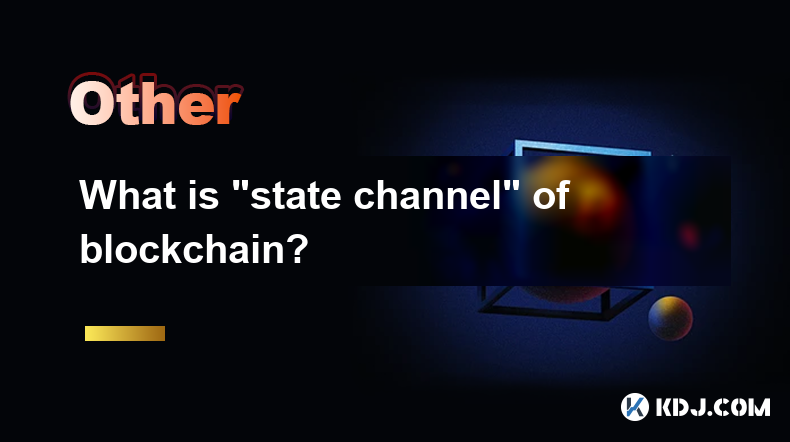
Understanding State Channels: Off-Chain Scaling Solutions
State channels offer a powerful solution to one of the biggest challenges facing blockchain networks: scalability. Traditional blockchains process every transaction on the main chain, leading to congestion and high fees, especially during periods of high activity. State channels address this by moving many transactions off-chain, only requiring updates to the main blockchain periodically. This significantly reduces the load on the main network. Think of it like having a side conversation with someone instead of announcing every detail to the entire room.
How State Channels Work: A Step-by-Step Guide
Imagine Alice and Bob want to exchange cryptocurrency many times. Instead of broadcasting each transaction to the blockchain, they open a state channel. This involves a transaction on the main chain establishing an initial state, defining how much cryptocurrency each party initially holds. The process unfolds as follows:
- Channel Opening: Alice and Bob create a smart contract on the blockchain, specifying the initial state of their funds.
- Off-Chain Transactions: Alice and Bob then exchange cryptocurrency multiple times without involving the blockchain. They only update their shared state.
- State Updates: Each transaction is recorded in a series of signed messages exchanged between Alice and Bob. These messages contain the updated state.
- Channel Closing: When Alice and Bob finish their transactions, they close the channel. This involves a final transaction on the blockchain reflecting the final state of their funds. This transaction settles all off-chain transactions.
This process allows for numerous transactions to occur quickly and cheaply off-chain. The only blockchain interaction happens at the beginning and end of the channel.
Security and Privacy in State Channels
A crucial aspect of state channels is their security. The use of cryptographic signatures ensures that only Alice and Bob can update the channel state. This prevents unauthorized modifications. Each update is digitally signed by both parties, guaranteeing its validity. The final settlement transaction on the blockchain is also cryptographically secured, preventing fraud. Furthermore, the transactions within the channel are private, visible only to Alice and Bob, improving user privacy. This privacy is a significant advantage over on-chain transactions, which are publicly recorded.
Types of State Channels
While the fundamental principle remains the same, different state channel implementations exist, each with its own nuances and applications. One key distinction lies in the underlying cryptographic mechanisms used to secure the channel and manage the state updates. Some channels utilize simpler cryptographic techniques suitable for smaller-scale transactions, while others employ more complex methods for larger-scale applications. The choice of implementation depends heavily on the specific use case and the desired level of security and scalability.
State Channels vs. Other Scaling Solutions
State channels are just one approach to scaling blockchains. Other methods include sharding, which divides the blockchain into smaller, more manageable parts, and layer-2 solutions, which build on top of the existing blockchain to handle transactions more efficiently. State channels differ from these in their focus on off-chain transactions between specific participants, making them particularly well-suited for frequent interactions between a small number of users. Sharding and layer-2 solutions, on the other hand, aim for broader network-wide scalability.
Limitations of State Channels
Despite their advantages, state channels have limitations. They are most effective for frequent interactions between a small number of participants. Scaling to a large number of participants becomes complex and less efficient. Furthermore, the initial setup of a state channel requires a transaction on the main chain, which can be expensive and time-consuming. The need for participants to remain online throughout the channel's lifecycle is another constraint. If one participant becomes unavailable, the channel might need to be closed prematurely.
Real-World Applications of State Channels
State channels are finding practical applications in various areas. One notable example is in payment systems, where they enable fast and low-cost microtransactions. They are also being explored for decentralized exchanges (DEXs), allowing for faster and more efficient trading. Furthermore, state channels can be used in supply chain management, enabling secure and transparent tracking of goods. The potential applications are diverse and continue to expand as the technology matures.
The Future of State Channels
Ongoing research and development are focused on improving the efficiency and scalability of state channels. Efforts are underway to address the limitations mentioned earlier, such as the complexity of managing a large number of participants and the requirement for continuous online participation. New cryptographic techniques and protocols are being developed to enhance security and reduce the overhead associated with channel management. As these improvements materialize, state channels are likely to play an increasingly important role in scaling blockchain networks.
Frequently Asked Questions
Q: Are state channels secure?
A: Yes, state channels utilize cryptographic techniques to ensure the security and integrity of transactions. Each state update is digitally signed by all participating parties, preventing unauthorized modifications. The final settlement transaction on the blockchain further guarantees the security of the overall process.
Q: How do state channels improve scalability?
A: State channels improve scalability by moving many transactions off the main blockchain. This significantly reduces the load on the network, leading to faster transaction times and lower fees. Only the initial setup and final settlement transactions need to be processed on the main chain.
Q: What are the limitations of state channels?
A: State channels are most effective for frequent interactions between a small number of participants. Scaling to a large number of participants can be complex. Participants also need to remain online throughout the channel's lifecycle. The initial setup can be expensive and time-consuming.
Q: What are some real-world applications of state channels?
A: State channels are used in payment systems for fast and low-cost microtransactions. They are also being explored for decentralized exchanges (DEXs) and supply chain management. The potential applications are diverse and continue to grow.
Q: How do state channels compare to other scaling solutions?
A: State channels differ from sharding and layer-2 solutions in their focus on off-chain transactions between specific participants. They are best suited for frequent interactions between a small number of users, while other solutions aim for broader network-wide scalability.
Disclaimer:info@kdj.com
The information provided is not trading advice. kdj.com does not assume any responsibility for any investments made based on the information provided in this article. Cryptocurrencies are highly volatile and it is highly recommended that you invest with caution after thorough research!
If you believe that the content used on this website infringes your copyright, please contact us immediately (info@kdj.com) and we will delete it promptly.
- Gold Exempt From New "Reciprocal" Tariffs
- 2025-04-04 06:35:12
- Time to Buy Aptos (APT) Cheap? This Chart Pattern Signals a 10% Move for the Price!
- 2025-04-04 06:35:12
- An Analyst Has Explained How Dogecoin Could Be at a Make-or-Break Level Right Now Based on a TA Chart Pattern
- 2025-04-04 06:30:12
- Micro Intelligence Company Strategy Has Purchased 22,048 Bitcoins Worth $1.92 Billion in a New Deal
- 2025-04-04 06:30:12
- BlockDAG's Beta Testnet Is Live— Aims to Achieve 15K TPS! Ethereum Price Falls 0.5% & ETC Dips 6.7%
- 2025-04-04 06:25:12
- title: New decentralized finance (DeFi) trading altcoin is surging after gaining support from the top US-based crypto exchange platform by volume
- 2025-04-04 06:25:12
Related knowledge

What are the future development trends of blockchain game development?
Apr 03,2025 at 05:00am
Blockchain technology has revolutionized various industries, and gaming is no exception. As we look to the future, several trends are set to shape the development of blockchain games. These trends not only promise to enhance the gaming experience but also to integrate blockchain technology more seamlessly into the gaming ecosystem. Let's explore these t...

What are the maintenance costs of blockchain system development?
Apr 03,2025 at 06:07pm
The maintenance costs of blockchain system development are multifaceted and depend on various factors. These costs can include technical maintenance, security updates, infrastructure expenses, and personnel costs. Understanding these elements is crucial for anyone planning to develop or maintain a blockchain system. Technical MaintenanceTechnical mainte...
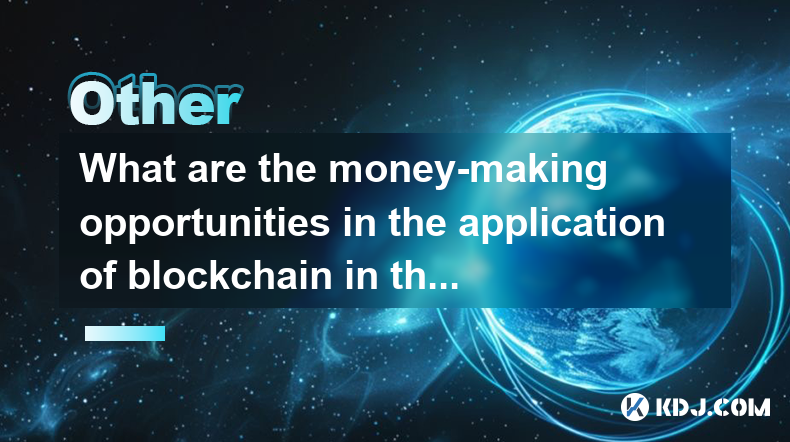
What are the money-making opportunities in the application of blockchain in the medical industry?
Apr 03,2025 at 03:35am
The integration of blockchain technology into the medical industry presents a myriad of money-making opportunities that can revolutionize healthcare systems. Blockchain's inherent characteristics, such as transparency, security, and immutability, make it an ideal solution for various medical applications. By leveraging blockchain, companies can develop ...
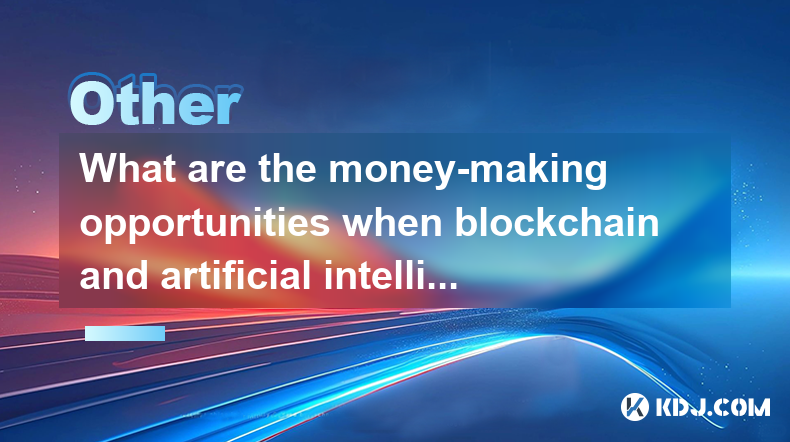
What are the money-making opportunities when blockchain and artificial intelligence are combined?
Apr 04,2025 at 01:28am
The convergence of blockchain and artificial intelligence (AI) presents a myriad of money-making opportunities within the cryptocurrency circle. This fusion leverages the decentralized and secure nature of blockchain with the analytical prowess of AI, creating innovative solutions and platforms that can generate significant revenue. From enhancing tradi...
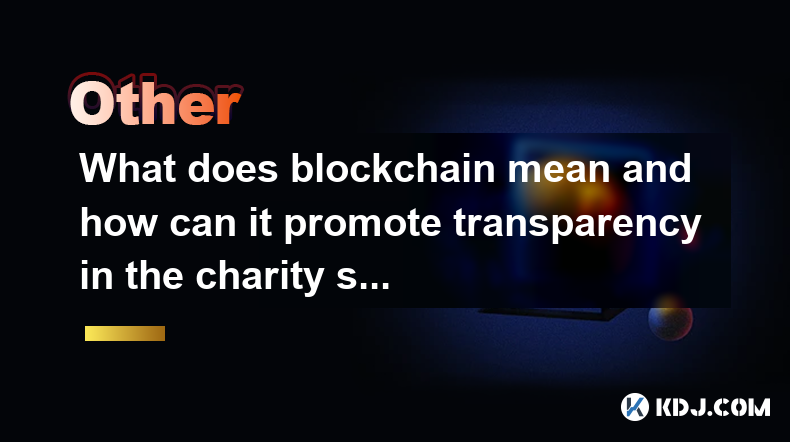
What does blockchain mean and how can it promote transparency in the charity sector?
Apr 03,2025 at 08:29pm
Blockchain technology is a decentralized, distributed ledger that records transactions across numerous computers. This ensures that the data is transparent and nearly impossible to alter retroactively. Essentially, blockchain serves as a digital ledger of all cryptocurrency transactions, enabling secure and direct exchanges without the need for intermed...
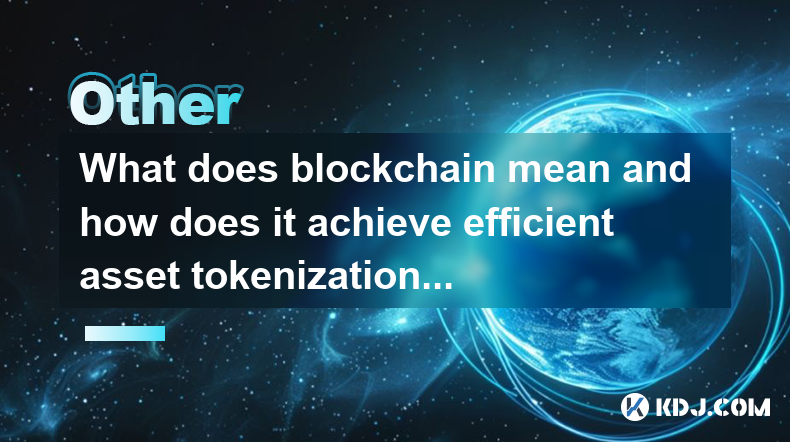
What does blockchain mean and how does it achieve efficient asset tokenization?
Apr 03,2025 at 07:57pm
Blockchain technology is a decentralized, distributed ledger that records transactions across numerous computers. It ensures that each transaction is secure, transparent, and immutable. The concept of blockchain was introduced with the launch of Bitcoin in 2009, but its applications have since expanded far beyond cryptocurrencies. At its core, blockchai...

What are the future development trends of blockchain game development?
Apr 03,2025 at 05:00am
Blockchain technology has revolutionized various industries, and gaming is no exception. As we look to the future, several trends are set to shape the development of blockchain games. These trends not only promise to enhance the gaming experience but also to integrate blockchain technology more seamlessly into the gaming ecosystem. Let's explore these t...

What are the maintenance costs of blockchain system development?
Apr 03,2025 at 06:07pm
The maintenance costs of blockchain system development are multifaceted and depend on various factors. These costs can include technical maintenance, security updates, infrastructure expenses, and personnel costs. Understanding these elements is crucial for anyone planning to develop or maintain a blockchain system. Technical MaintenanceTechnical mainte...

What are the money-making opportunities in the application of blockchain in the medical industry?
Apr 03,2025 at 03:35am
The integration of blockchain technology into the medical industry presents a myriad of money-making opportunities that can revolutionize healthcare systems. Blockchain's inherent characteristics, such as transparency, security, and immutability, make it an ideal solution for various medical applications. By leveraging blockchain, companies can develop ...

What are the money-making opportunities when blockchain and artificial intelligence are combined?
Apr 04,2025 at 01:28am
The convergence of blockchain and artificial intelligence (AI) presents a myriad of money-making opportunities within the cryptocurrency circle. This fusion leverages the decentralized and secure nature of blockchain with the analytical prowess of AI, creating innovative solutions and platforms that can generate significant revenue. From enhancing tradi...

What does blockchain mean and how can it promote transparency in the charity sector?
Apr 03,2025 at 08:29pm
Blockchain technology is a decentralized, distributed ledger that records transactions across numerous computers. This ensures that the data is transparent and nearly impossible to alter retroactively. Essentially, blockchain serves as a digital ledger of all cryptocurrency transactions, enabling secure and direct exchanges without the need for intermed...

What does blockchain mean and how does it achieve efficient asset tokenization?
Apr 03,2025 at 07:57pm
Blockchain technology is a decentralized, distributed ledger that records transactions across numerous computers. It ensures that each transaction is secure, transparent, and immutable. The concept of blockchain was introduced with the launch of Bitcoin in 2009, but its applications have since expanded far beyond cryptocurrencies. At its core, blockchai...
See all articles






















































































